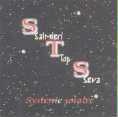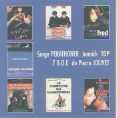Jannick Top Interview 2000
This interview was originally
published in a Japanese Magazine "Euro Rock Press vol.6".
With kind permission from the publisher and Jannick Top himself I can introduce the
English version to you.
For those who want to use all or parts of this article, you should ask for permission of
EURO ROCK PRESS c/o Marquee Inc.
102 Maison Mejiro, 3-1-17, Shimo-Ochiai,
Shinjuku-Ku, Tokyo 161-0033
JAPAN
Tel:+81-3-3954-2055 Fax:+81-3-3954-9563
@
Q1: Were you invited to Magma 30th anniversary? (As a bassist in jam session?)
A1: Yes I was invited to Magma's 30th birthday but I was not in Paris the day it played so...
Q2: In your youth you were educated as a classic musician. What did you learn through the experience of classic music?
A2: My classical music background (piano, cello, directing an orchestra...) has been invaluable to me, in that it has enabled me to express myself through a musical instrument, to devote myself to my craft and to compose music, but most of all to share with others (musicians and the public alike) moments of pure magic - moments whose impact is much more profound than one might think. This in turn taught me how crucial it is to develop a strong work ethic, for the benefit of both our emotional well-being and to sharpen our musical instinct.
Q3: I hear you specialized in cello and is that the reason you tune your bass guitar just as a cello? What is the advantage of it?
A3: My instrument of choice was the piano, followed by the cello. The bass came later.
(From 4th stirng to 1st
string)
E (mi) A (la) D (re) G (sol) then D (re) A (la) D (re) G (sol)
Shortly thereafter came:
D (re) G (sol) D (re) A (la) and finally C (do) G (sol) D (re) A (la)
My initial reason for this
change was the feeling that the lower notes weren't deep enough. Having played the cello
certainly contributed to the final tuning.
The advantage is having direct and immediate access to the tenth, and having a large range
"in hand" (half a tone larger than the 5-string instrument, with only 4
strings).
As for the bass, the fifth is more natural than the fourth (succession of natural
harmonies). However, this complicates brief intervals, and playing a simple scale can in
some cases be excruciatingly difficult.
Q4: When did you start your career as a proffessional musician? Your 1st recording was Troc album?
A4: In the seventies (almost a century back!), Troc was the first record.
Q5: How did you join Magma?
A5: Playing with Troc at a club in Saint-Germain called "La Bulle", I met Christian Vander. After my second meeting with him, I joined the group.
Q6: As the music of Magma is so unique, I guess it influenced you so much. How was the experience with them?
A6: Playing with Magma, I learned, in a different way, that you've got to be yourself, and that's how we naturally got back together. This in turn gave me the chance to further explore this spirited music.
Q7: How do you appreciate Christian Vander's works? Do you think Kobaian is important?
A7: Christian Vander is a true artist, a true creator of music, which is extremely rare. Kobaia really is a part of his identity. Using "Kobaian" has definitely allowed him to express his imagination through sound, in a way that transcends familiar words.
Q8: Let us know the reason you left Magma after the legendary gig at Colmar October 1974.
A8: I felt out of my element with the group's entourage and was too young to have the necessary perspective, in part because the group's collective experiences were very powerful.
Q9: You played with Utopic Sporadic Orchestra only once at Nancy Jazz Pulsation 1975. Could you tell us more about this mysterious orchestra?
A9: I'm still very motivated by the desire to play this music.
Q10: Your composition De Futura was called De Futura Hiroshima in its early days. Hiroshima is the name of a city in Japan, which was atomically attacked in 1945. Why was it in the title? Is it a warning to future nuclear wars?
A10: Human barbarism reached a new low in Hiroshima, which forced people to do some soul-searching. Citation of a french philosopher whose I forgot the name "Science sans conscience n'est que ruine de l'āme...(Science without a conscience destroys the soul)". That was the source of inspiration for "De Futura".
Q11: You released your only single disc Utopia Viva c/w Epithecanthropos Erectus II in 1975. Tell us about this hard to find but incredibly fantastic recording.
A11: I recorded the single "Utopia Viva" through the impetus of Giorgio Gomelsky, Magma's manager. Our collaboration ended there. I fully intend to record a solo album. The question of choosing a record label hasn't been addressed as yet.
Q12: I found your name in Heldon's "Un Reve sans Consequence Speciale" album which was issued in 1976. Have you ever played with them on stage?
A12: No I never played with Heldon on stage.
Q13: In 1976 you re-joined Magma to record one album (Udu Wudu) and give one tour (so called Reneaissance Tour). How did you participate and why did you quit?
A13: My initial attitude was "I'll put all of this behind me and start from scratch", but I quickly found out that keeping external influences at bay was very difficult.
Q14: Since your second departure from Magma you have played with so many musicians. Except Fusion and STS have you formed any band as a regular member, or all of them were only temporary guest appearances?
A14: Jean-Louis Chautemps (saxophone), Andre Cecarelli, and myself formed a group called "SOS Decybels". We played an unconventional brand of jazz.
Q15: How was the collaboration with George Jinda in.Speed Limit project?
A15: I don't feel like going into details.
Q16: You have often played with Ander Ceccarelli and recorded some materials. Could you mention names of your key collaborations with him?
A16: I composed and produced a suite entitled "Life Is Only Here", included in his "Cecarelli" album. Aside from that, we played together in "Troc" and "Decybels".
Q17: Let us know about your impression when you played again with Christian Vander in Fusion group. Did you perform many times on stage?
A17: Vander, Widemann, and Lockwood - each of them was unique - and as meticulous as they were far out. Widemann in particular was a master. I'm very happy to have worked with them. We even had the dubious distinction of being given the "Worst Album of the Year" award by a music journalist. A smashing success, in other words. We mostly played in clubs.
Q18: Did you have any paticular reason for not joining Magma's Retrospective in 1980?
A18: No particular reason, other than wanting to keep the power of these moments intact...
Q19: In 80's and 90's we have felt unsatisfied that your originality and creativity have been heard in your works less than in 70's. We guess you were too busy playing in studio session or as an tour member to present you own music?
A19: I needed all of this time to keep the flame alive, and am just now beginning to think in terms of once again working on the music that I love, music that stirs the soul.
Q20: How was your playing again with re-united Fusion group in 1995? Is this the trigger for you to form STS?
A20: Fusion got back together to celebrate 20 years of collaboration between JMS (Jean-Marie Salmani- Fusion's producer, among other things) and Didier Lockwood. STS was already in existence at the time.
Q21: What ideas do you have with STS group? What is STS's goal?
A21: This music borrows heavily from jazz in terms of its lively and improvised nature, yet has a very precise and well-defined structure (although this music doesn't consist of standards), and by incorporating sound effects. Our goal is to explore these musical directions further, particularly by incorporating ethnic qualities.
Q22: Who are the present personnel of STS group? Any guest appearance?
A22: STS is really a group consisting of three musicians (Salmieri, Top, and Seva), who call upon the services of a guest musician- there are two of them at the moment (Thibaut Abrial and Mathias Desmier, both guitarists). For more information, ask Eric Seva or Claude Salmieri, because that's all I know for the time being.
Q23: Are there any groups you join now except STS?
A23: I do not work with any groups other than STS, with the exception of my solo album, which for the moment is a future project.
Q24: Let us know your instruments and devises at present.
A24:
Bass: SADOWSKY (Fret), Tom ANDERSON (Fretless), Godin FENDER (jazz bass) - Electro-dynamic
Bass: Gougi (Bass cello)
Amplifier: SWR
Sound effects: Boss pedals - Jamman - Digiteck (Multiple effects)
Q25: What kind of instrument is a fretcello. A cello with frets?
A25: Yes it is a cello with frets.
Q26: Dose STS have any plan of future recordings, and coming to Japan?
A26: Recording project for STS' second album. We are definitely coming to play in Japan, but Lord only knows when.
@
Jannick Top official website : http://www.1212.com/a/top/index.html
Please send me your impression : tabockly@kl.wind.ne.jp
@
@ STS / Systeme Solaire
STS / Systeme Solaire
Serge Perathoner, Jannick
Top / 7 B.O.F. de Pierre Joilivet 
@
@